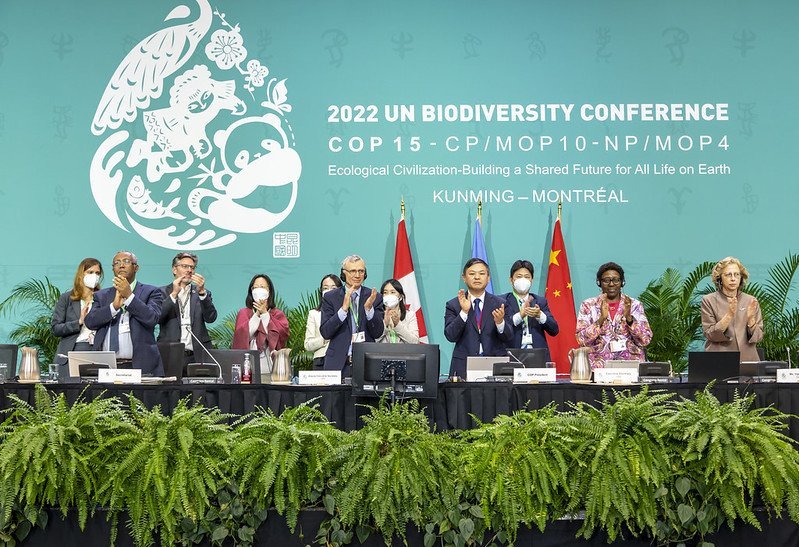Land, air and sea - is 2023 the year to integrate nature and climate?
In the past few months we have seen some impressive global climate and biodiversity successes with the Global Biodiversity Framework and the UN High Seas Treaty. We see this as having the potential to integrate climate and nature agendas more effectively, and are well timed for COP28 preparations.
Convention on Biological Diversity COP 15
COP 15 UN Biodiversity conference
2022 ended with a landmark agreement on biodiversity in Montreal at the CBD (Convention on Biological Diversity) COP15. It was the biggest biodiversity conference in a decade where countries struck a historic deal on protecting and restoring nature. The deal for nature was heralded as the “Paris moment” for biodiversity.
The agreement sets out how to safeguard plant and animal species and ensure natural resources are used sustainably, adopting a 2030 deadline to protect 30% of the world’s lands, oceans, coasts, and inland waters, cut subsidies that harm nature by US$500 billion, reduce the loss of areas of high biodiversity importance to near zero, and cut food waste by 50%.
The Kunming-Montreal Global Biodiversity Framework (GBF) pledges $200 billion in biodiversity funding from public and private sources, including at least $20 billion per year by 2025, and $30 billion per year by 2030.
The HIgh Seas TREATY
The High Seas Treaty was agreed on 4 March 2023 (at least the text to be adopted) after almost 20 years of negotiations. The United Nations countries have agreed the first ever treaty to protect the world's oceans that lie outside national boundaries - this is the first global agreement focused on keeping marine life in the ocean and could be massive for helping to reverse biodiversity losses and contribute to the GBF and climate change efforts, as the ocean helps absorb almost half of humanity’s emissions.
Moment when UN member states reach agreement on high seas treaty
“What happens on the high seas will no longer be ‘out of sight, out of mind, we can now look at the cumulative impacts on our ocean in a way that reflects the interconnected blue economy and the ecosystems that support it.”
The road to cop28 in dubai
COP28, which will be hosted in the UAE in 2023 at Expo City Dubai, is being hailed by UAE leaders as the most important event of the year, coinciding with the UAE National Day. The event will be well attended, with over 140 heads of state and government leaders, over 80,000 delegates and more than 5,000 media professionals expected. President Sheikh Mohamed has also declared 2023 the 'Year of Sustainability', with continued support of innovation in the field of sustainability.
The UAE COP leadership team has been announced, with H.E. Dr. Sultan Al Jaber appointed as President-Designate, H.E. Razan Al Mubarak (HLC and one of our clients) as UN Climate Change High-Level Champion and H.E. Shamma Al Mazrui as the Youth Climate Champion.
The UAE has received some criticism internationally for appointing the CEO of Adnoc as the COP28 President-Designate. However, in our view, it’s crucial to involve the oil and gas industry in the transition to clean energy, and the CEO of a national oil company will be well placed to speak with authority to this sector. For example, at the Houston energy conference, he appealed to oil and gas companies to deal with their scope 3 emissions, which would be a massive step change for the sector if implemented.
“Energy leaders in this room have the knowledge, experience, expertise and the resources needed to address the dual challenge of driving sustainable progress while holding back emissions. Alongside all industries, the oil and gas needs to up its game, do more and do it faster.”
The pace of energy transition to meet climate goals is going to be perceived by civil society actors as a key issue for COP28 - is it happening fast enough? And how can it be accelerated? How can you reconcile massive investments in the oil and gas infrastructure to keep supply lines reliable, whilst pledging that emissions and reliance on fossil fuels will decline? The potential for conflicts arising over these issues is high, particularly as many in civil society has legitimate concerns about the role international oil and gas companies have played in the past to discredit climate science (eg. Exxon).
It would be great to see the following developments this year in the lead up to COP28 and beyond:
Better alignment and integration between climate and biodiversity agendas: is there any scope to combine the CBD and UNFCCC secretariats and conventions in the future? Can the same be done for the NPS action agendas for climate and biodiversity?
Ensure the COP28 outcome includes Nature-based Solutions in the global stock take, with investigation on how much further we need to go to unleash its potential
Adnoc to expand its net zero target to include scope 3 and therefore lead from the front to engage with the oil and gas sector ahead of COP28
CONTACT US IF YOU WANT TO PARTNER WITH EARTH MATTERS CONSULTING, we ARE READY TO SUPPORT YOU IN YOUR JOURNEY, WHETHER YOU ARE A BUSINESS, GOVERNMENT ON NON-PROFIT ORGANISATION.
Email info@earth-matters.net or call us on +971 (4) 368 0892


